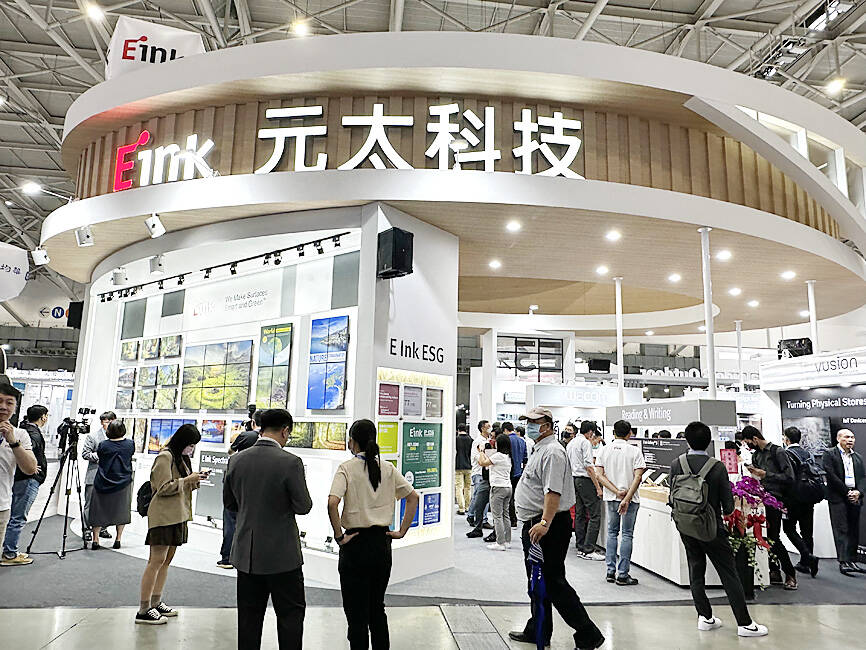E-paper display supplier E Ink Holdings Inc (元太科技) yesterday said its revenue growth is to recover this year as its customers rapidly adopt new four-color e-paper displays used in electronic shelf labels (ESLs).
Last year, customers’ inventory adjustments of previous-generation three-color e-paper displays slowed down their transition to new four-color e-paper displays for ESL and constrained E Ink’s revenue growth, the firm said.
The supply chain issue “is not a concern now,” E Ink chairman Johnson Lee (李政昊) told investors yesterday, adding that customers’ inventories are expected to return to a healthy level this quarter.

Photo: Chen Mei-ying, Taipei Times
In addition, the supply of driver ICs and display modules used in the new ESL displays are expected to improve this year, he said.
“The first quarter will be the trough for the ESL business, which will improve every quarter this year,” Lee said.
Feedback from its partners showed that about 80 percent of its customers plan to adopt four-color e-paper displays this year, compared with 20 percent in October last year, he said.
“Overall, the outlook for 2024 will be better than 2023,” Lee said. “Revenue this year will also be higher than last year, with the growth rate hinging on customers’ product transitions.”
E Ink posted revenue of NT$27.12 billion (US$861 million) for last year, down 9.78 percent from NT$30.06 billion in 2022.
In contrast to the clearer visibility for its ESL business, e-paper for consumer electronic applications — mostly e-readers and e-notes — are a “wild card” this year, Lee said, citing customers’ delayed launches of new models equipped with color displays instead of monochrome displays.
E Ink said its capacity expansion plans are on schedule, with the new production line in Hsinchu, dubbed H5, likely to enter volume production in the fourth quarter at the earliest to produce large-size e-paper displays measuring 85 inches to 95 inches (216cm to 241cm) for outdoor signages.
Another new production line, H6, is to enter operation in 2026 to manufacture even larger e-paper displays, the firm said.
The company has decided to restart its new plant construction in Taoyuan’s Guanyin District (觀音) this year, and is expanding module capacity at its Yangzhou plant in China for super-large e-paper displays from 75-inch to 100-inch displays, it said.
The Hsinchu-based company’s net profit fell 21 percent last year to NT$7.82 billion, from NT$9.91 billion a year earlier, and earnings per share dropped to NT$6.85, from NT$8.69.
Non-operating profit shrank 12 percent annually to NT$2.54 billion, attributable to a dip of 60 percent in royalty income, it said. Since 2019, E Ink has generated more operating income than the income from licensing its display patents, it added.
The firm’s board of directors last month approved a cash dividend distribution of NT$4.5 per share, with a payout ratio of 66 percent, up from 52 percent the previous year.

Sweeping policy changes under US Secretary of Health and Human Services Robert F. Kennedy Jr are having a chilling effect on vaccine makers as anti-vaccine rhetoric has turned into concrete changes in inoculation schedules and recommendations, investors and executives said. The administration of US President Donald Trump has in the past year upended vaccine recommendations, with the country last month ending its longstanding guidance that all children receive inoculations against flu, hepatitis A and other diseases. The unprecedented changes have led to diminished vaccine usage, hurt the investment case for some biotechs, and created a drag that would likely dent revenues and

Global semiconductor stocks advanced yesterday, as comments by Nvidia Corp chief executive officer Jensen Huang (黃仁勳) at Davos, Switzerland, helped reinforce investor enthusiasm for artificial intelligence (AI). Samsung Electronics Co gained as much as 5 percent to an all-time high, helping drive South Korea’s benchmark KOSPI above 5,000 for the first time. That came after the Philadelphia Semiconductor Index rose more than 3 percent to a fresh record on Wednesday, with a boost from Nvidia. The gains came amid broad risk-on trade after US President Donald Trump withdrew his threat of tariffs on some European nations over backing for Greenland. Huang further

CULPRITS: Factors that affected the slip included falling global crude oil prices, wait-and-see consumer attitudes due to US tariffs and a different Lunar New Year holiday schedule Taiwan’s retail sales ended a nine-year growth streak last year, slipping 0.2 percent from a year earlier as uncertainty over US tariff policies affected demand for durable goods, data released on Friday by the Ministry of Economic Affairs showed. Last year’s retail sales totaled NT$4.84 trillion (US$153.27 billion), down about NT$9.5 billion, or 0.2 percent, from 2024. Despite the decline, the figure was still the second-highest annual sales total on record. Ministry statistics department deputy head Chen Yu-fang (陳玉芳) said sales of cars, motorcycles and related products, which accounted for 17.4 percent of total retail rales last year, fell NT$68.1 billion, or

HSBC Bank Taiwan Ltd (匯豐台灣商銀) and the Taiwan High Prosecutors Office recently signed a memorandum of understanding (MOU) to enhance cooperation on the suspicious transaction analysis mechanism. This landmark agreement makes HSBC the first foreign bank in Taiwan to establish such a partnership with the High Prosecutors Office, underscoring its commitment to active anti-fraud initiatives, financial inclusion, and the “Treating Customers Fairly” principle. Through this deep public-private collaboration, both parties aim to co-create a secure financial ecosystem via early warning detection and precise fraud prevention technologies. At the signing ceremony, HSBC Taiwan CEO and head of banking Adam Chen (陳志堅)